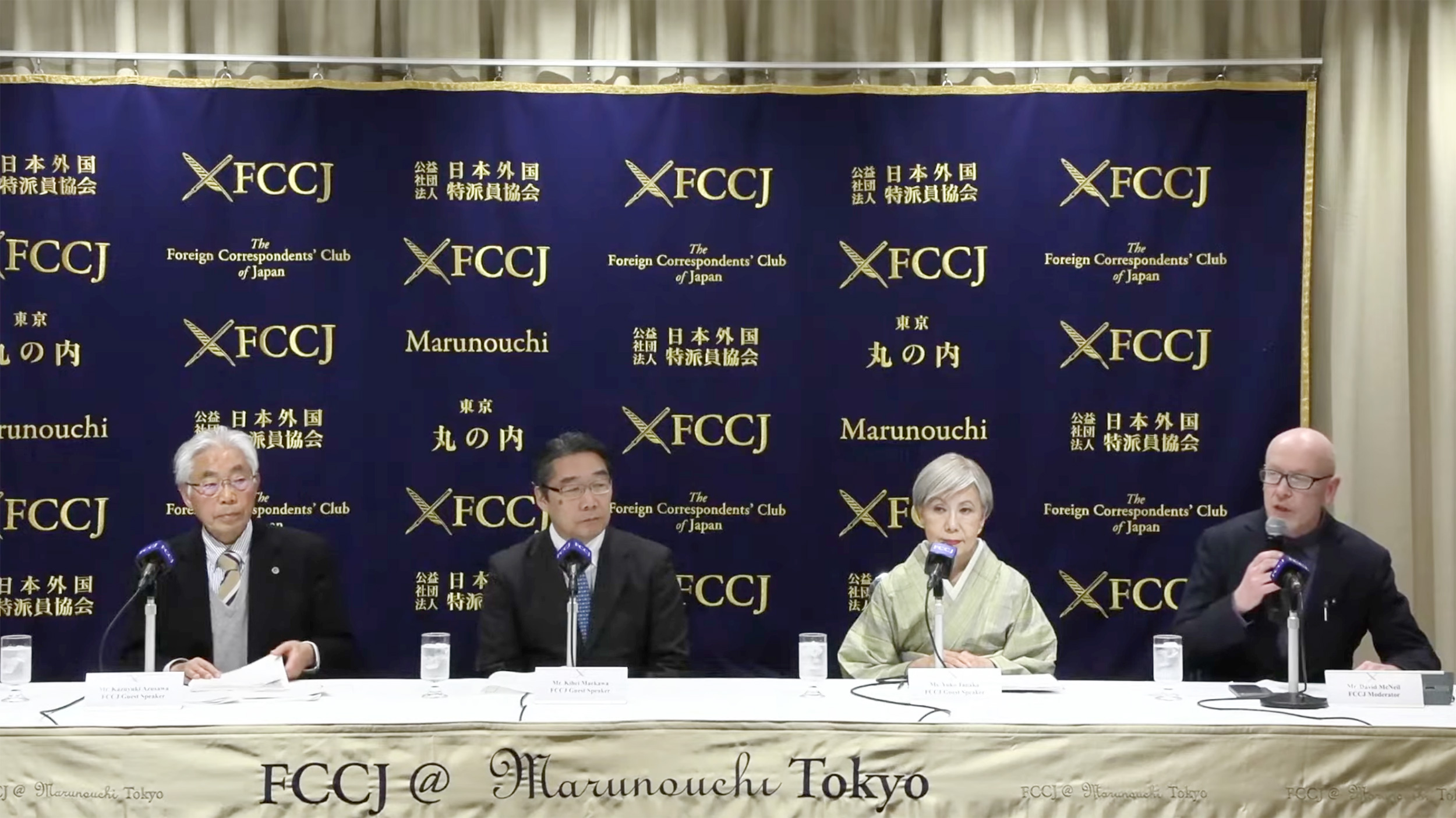Issue:
March 2024
Activists will use shareholder clout to remind TV networks of their journalistic mission

The government of Prime Minister Shinzo Abe was repeatedly criticized for trying to cajole and intimidate the media to ensure more compliance with his party’s views. Public documents released after Abe resigned in 2020 strongly suggest that his administration meddled in television programs, discouraged discussion about major policy changes and tried to dodge journalistic inquiry.
Such claims have been aired repeatedly, but a group of activists led by Yuko Tanaka, a former president of Hosei University, and Kihei Maekawa, a former administrative vice minister for education, insist they can do something about it. Their organization, TV Shine! Citizens Network, says shareholder activism can stop the journalistic rot that set in during the Abe era.
Lawyer Kazuyuki Azusawa explained at an FCCJ press conference on February 5 that supporters this year plan to buy shares in the five Tokyo-based nationally networked TV companies. If shareholders band together, he said, they can drive industry reform and remind journalists of their mission. The activists were triggered partly by the networks’ “eerie silence” on Japan’s biggest issues, notably its military buildup, he added.
Watch the Press Conference: Saving Japanese TV
Azusawa said alarm bells started ringing about midway through the Abe era, in 2014-15, when the government’s communications minister, Takaichi Sanae, threatened to close TV stations that broke rules on impartiality. The recent publication of internal documents from the telecommunications ministry appear to confirm that a top Abe aide tried to pressure ministry bureaucrats into changing their interpretation of the Broadcast Law.
The Abe government floated plans to radically shake up the TV industry, including scrapping Article 4 of the Broadcast Law, modelled on the U.S. “fairness doctrine” mandating that broadcast companies be politically impartial or lose their right to broadcast. The plans seem to have been driven by distrust of “liberal bias” in the media.
“After the second Abe administration it became obvious that it tried to interfere in many TV programs with arm-twisting and cajoling. That has become clear in public documents,” said Tanaka, the organization’s co-chair. TV, she added, must return to its role of scrutinizing politicians and the powerful, otherwise it is failing in its mission to the public.
Her fellow co-chair Maekawa agreed. “Without the media, democracy will not survive,” he said. “The media must be able to watch over and monitor the authorities on behalf of the people. Have those in power become servants of some rather than the whole? Are they preparing for war without the knowledge of the sovereign people? The role I expect the media to perform is to expose the reality of power and inform people about it.”
Shine TV!’s 100-plus supporters include Kenji Utsunomiya, a former candidate for Tokyo governor and president of the Japan Federation of Bar Associations; poverty campaigner Karin Amamiya, and former NHK reporter Yuji Osaki. In April, they plan to make a set of formal shareholder proposals to the big networks. Among them is the demand that “television executives and employees observe the autonomy and independence as stipulated in the Broadcasting Act”.
“In the event of any suspected ‘intervention’ by the administration, political parties, politicians ... in individual TV news programs, a third-party committee consisting of external members shall be established to verify the situation, and the results of the investigation shall be made public,” they said.
In addition to stronger third-party oversight, Azusawa said the shareholders will demand limited terms for TV executives, to make them more accountable to the public. One of the concerns that emerged during the Abe era, he said, was the wining and dining by Abe and Yoshihide Suga of senior broadcast executives. “Their intention was very clear: they did not want the broadcasters to freely report on political and national security issues."
Azusawa and his colleagues are riding a wave of shareholder activism. During last year’s general meeting season, 81 shareholder proposals were voted on at Japan’s top 225 companies, according to data reported by Reuters. Tokyo Electric Power, Mitsubishi and Sumitomo Mitsui Financial Group are among a growing number of firms facing demands from activist shareholders such as Kiko Network, “urging greater commitment to tackling climate change at their annual meetings.”
Last year’s revelations that television had for decades declined to report on claims of sexual abuse by pop mogul Johnny Kitagawa have further tarnished public confidence in the media, Tanaka said, adding that Japanese TV must reform or die. “What I want from TV is to present unbiased and accurate data and a variety of well-reasoned opinions. We’re not getting that right now.”
David McNeill is professor of communications and English at University of the Sacred Heart in Tokyo, and co-chair of the FCCJ’s Professional Activities Committee. He was previously a correspondent for the Independent, the Economist and the Chronicle of Higher Education.

